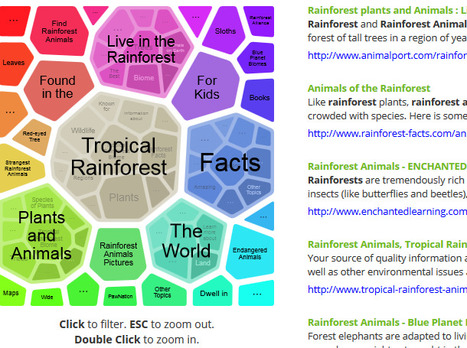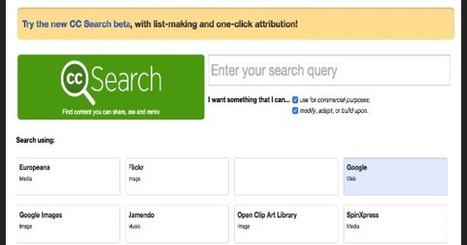Via Charles Tiayon
Get Started for FREE
Sign up with Facebook Sign up with X
I don't have a Facebook or a X account
 Your new post is loading... Your new post is loading...
 Your new post is loading... Your new post is loading...

John Evans's comment,
June 29, 2016 9:04 AM
Just tried to access the site and it seems to have been shut down.

Dennis Swender's curator insight,
October 26, 2016 12:40 PM
Site is no longer in operation - but the concept insight lends itself to further entrepreneurship

Olga Senognoeva's curator insight,
May 6, 2014 3:51 AM
Список поисковых инструментов, альтернативных Google. Если ссылка не открывается - обратите внимание на перечисление поисковиков в первом абзаце поста. 
wanderingsalsero's curator insight,
May 6, 2014 8:06 PM
The author is right: as long as we continue to think that Google is "THE" internet search engine....we can't complain about how Google treats us. I need to look into these alternatives too. |

Graham Drage's curator insight,
January 28, 2015 2:09 AM
This summarises the ways that social media activity can boost your website rankings in Search Engines. Yes businesses in Britain need to start engaging with social media! 
2DiFore Marketing Solutions's curator insight,
January 30, 2015 8:01 AM
We were asked an interesting question last night at an association meeting from a production builder...."does social media work to bring customers to my door"? Well the answer is yes but you must have a plan in place just like building a home, this infographic rounds out this weeks tips! Have a great weekend... 
Jeroen Lugtigheid's curator insight,
February 24, 2015 2:51 AM
Waarom niet? Een keertje een uitgebreide infographic. Maar wel eentje die de samenhang laat zien tussen zinvolle, rijke social media inzet en Google Ranking. Daar zitten vast wel wat tips tussen die je kunt gebruiken. |

















Have you ever wondered why you rank well (e.g., Page 1) on Google, but rank poorly (Page 4 or lower) on other search engines, like Bing?
It can be confusing.
You’ve invested in SEO.
Shouldn’t optimizing for one search engine work for all search engines?
Well, not always.
Good SEO isn’t only optimizing for one search engine.
Google is the world’s most popular search engine.
Their algorithm updates have reshaped search and SEO time and time again.
As a result, some SEO professionals today completely ignore any search engine that doesn’t start with “G” and end in “oogle”.
That’s a problem.
While Google owns 91.98% of the global market share, its total U.S. market share is 88.3%, according to StatCounter as of March 2020.
That means more than a third of your U.S. customers are searching for you on platforms other than Google.
So if you’re only optimizing for Google, you’re missing a huge share of the market.
Fortunately, optimizing your content to appeal to search engines beyond Google doesn’t mean starting from scratch.
Bing (and by proxy Yahoo, which has been powered by Bing since 2010) is the second most popular search engine in the world.
Together, Bing and Yahoo own 4.21% of the total global desktop search engine market share and 10.05% of the U.S. market share.
The best news?
SEO techniques work similarly across both platforms.
So you can continue to focus on content marketing and link building.
But, as you may already have guessed, Bing and Google have a few key differences.
These differences may lead to discrepancies in your rankings.
This chapter will cover how building links for Bing differs from link building for Google and how you can create one link building strategy that will help you optimize for both search engines.
1. Be (Cautiously) More Aggressive with Link Count
Google and Bing both value backlinks with a few important differences.
One of those differences is regards to quality versus quantity.
Google tends to value PageRank as one of its key ranking signals, even though they removed it. In Google Search Console, Google used to describe PageRank as:
“PageRank is Google’s opinion of the importance of a page based on the incoming links from other sites. (PageRank is an important signal, but it’s one of more than 200 that we use to determine relevancy.) In general, a link from a site is regarded as a vote for the quality of your site.”
In recent years, we’ve seen a declining correlation between link count and Google rankings. In fact, some sites that rank well don’t have a lot of inbound links — they have more authoritative inbound links.
This means Google considers a few high-quality links with more PageRank to be infinitely more valuable than hundreds of links from low-quality sites.
Meanwhile, Bing also values high-quality links. But Bing places more importance on link quantity:
“Links pointing to your site help Bing discover new pages on your site. Traditionally, it is also regarded as a signal of popularity. The site linking to your content is essentially telling Bing that they trust your content.”
Want to improve your site’s Bing ranking in a hurry? Build a few more links each month than you otherwise might have.
Just remember that link quality matters. You absolutely shouldn’t start linking to spammy or irrelevant sites.
How Many Links Are Enough?
My team conducted a link building survey. We polled 628 advanced SEO professionals to find out how many links they build per website per month. Here’s what we found:
The bottom line:
A word of caution: you want your site to rank for both Google and Bing with the same link profile. So be mindful of Penguin.
Don’t go too wild. Like Google, Bing hates link schemes, reciprocal links, and spammy paid links.
For the best results, build no more than 20 backlinks each month. Focus on authoritative top-level domains and well-established sites.
Bing heavily weighs .gov, .edu, and .org domains. Bing also places greater emphasis on domain age than Google.
2. Place Less Emphasis on Anchor Text Diversity
There’s a noticeable difference in Bing’s attitude towards keywords in the anchor text when compared to Google.
Since Google’s 2012 Penguin update, sites with too much exact-match anchor text are liable to get slapped with a penalty.
How has the competitive landscape changed?
Find out if your competitors secured their market positions in recent months.
Now compare that to Bing’s guidelines, which actually encourage you to optimize your anchors:
The practical consequence of this is that we see 10% more sites on Bing with keyword-rich anchor text. In fact, more than half of Bing’s top 30 results (52-53%) all contain optimized anchors.
Given this, it’s theoretically possible (and quite easy) to over-optimize your links for Bing, though I don’t recommend it.
Your site ranking will almost certainly plunge on Google as Penguin hits you for over-optimizing your anchor.
Instead, use a cautious blend of exact-match anchor text with branded, naked link, partial match, long tail, generic, and other types of anchor text.
If you want to start increasing your amount of anchor text with keywords, make sure you:
3. Drive Links with Social Media
Bing has stated outright that their algorithm considers social media signals in site rankings:
In fact, Searchmetrics’ analysis of Bing’s ranking factors found that not only does Bing value social signals, but that social signals have a strong correlation with better rankings.
This coincides nicely with some of the new data our recent poll uncovered – that modern SEO professionals consider social sharing to be one of the most efficient ways to build links in 2017.
In fact, 68% of the polled advanced SEO professionals, who have used social sharing with link building in mind, found it to be efficient:
A few more specific examples of how our respondents have used social media during June 2016 – June 2017 to increase their backlink profiles:
You can also use software to search for influencers in your niche on the platform of your choice.
Create a list of these influential figures.
Then, when you create high-quality content that might appeal to them, reach out to them.
Ask them to share it.
(Our research showed original data/research to be the most compelling and efficient type of content for link building).
Finally, don’t forget about video content.
While YouTube might be the one-stop-shop for all things video, you don’t want to lose out on the benefits of those hard-earned backlinks.
Instead, find a native hosting solution for your video content.
Then reach out to people who have liked and shared your videos in the past.
Ask them to link to your website instead of YouTube.
Conclusion: Don’t Sabotage Google SEO While Link Building for Bing
One thing I haven’t touched on in this article is that if you wanted to build links exclusively for Bing, it would theoretically be much easier than building links for Google.
Unlike Google, Bing doesn’t mind if you ask other sites for links, as long as those sites are reasonably authoritative.
However, there’s little sense in building a bunch of links for Bing if it’s going to drop your Google rankings in the process.
So, rather than optimizing for one search platform over another, you’re better off looking to your content.
After all, creating link-worthy content is the best type of link building.
As Bing’s Webmaster Guidelines state:
Ultimately, link building isn’t about optimizing for a particular search engine.
It isn’t about discovering a loophole that will help you game an algorithm.
Good link building starts with mutual trust.
You write content someone values.
You earn their respect.
And, as a result, they will share your valuable content with others.
Only once you have the right content is it time to use the strategies above.
These will help earn your content a few more interested eyeballs.
To borrow one of Bruce Clay’s metaphors:
“In fishing, there’re a couple of things you have to do. 1) You have to use the right bait; 2) you have to fish where the fish are. That is link building. You have to come up with something that your community cares about and then put it in front of them.”